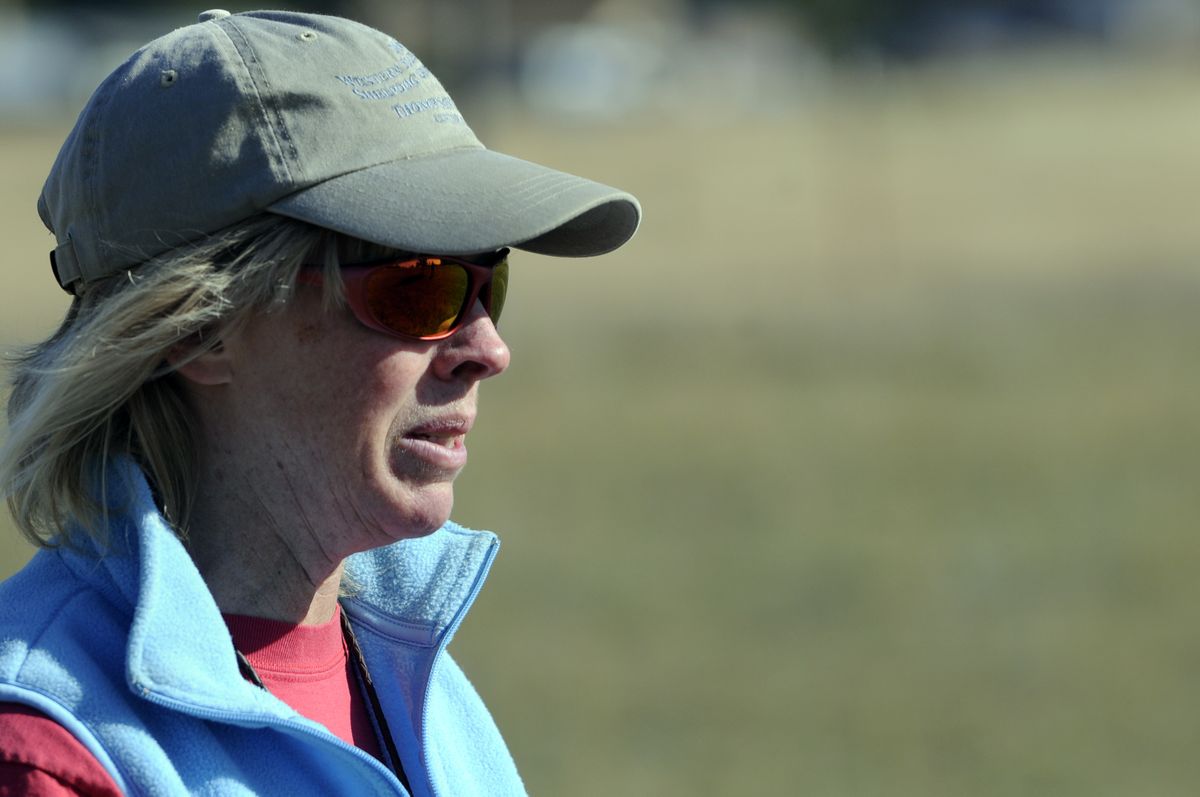‘A sense of beauty’
Dog trainer Noelle Williams and her border collies get great pleasure from competition

DEER PARK – Most employers would give anything for a worker like Nap. He’s loyal, prompt, respectful, and he loves his job more than anything. On a crisp fall morning, he eagerly awaited his next assignment. He focused his warm brown eyes on his boss, and when she continued to chat with visitors he laid his head against her knee and gazed at her adoringly. What boss wouldn’t like that?
Oh, and don’t worry about pay – for Nap, work is its own reward. All he asks is enough water to take a dip between jobs.
Nap is a 4-year-old border collie. His job is to herd sheep. He was bred and raised by Noelle Williams at the Jumpin’ Double Ewe Farm in Deer Park. Williams has been raising border collies since 1990. She and her dogs spend much of the year competing in sheepdog trials across the Pacific Northwest.
“Twenty years ago I did obedience training as a hobby,” Williams said. But in 1986 she got her first border collie, Mick. She fell in love with the breed and soon found her calling in training these dogs for competition.
Border collies originated in Great Britain near the Scottish border. Williams said, “About 100 years ago sheepdog trialing came into existence when shepherds wanted to see which dog had the most ability, stamina and desire to work.”
The highly competitive Williams takes great pleasure and satisfaction in the often grueling world of sheepdog trials. “I enjoy being around the people,” she said. “My competitors are my friends.”
As she strode toward the pasture, Nap danced around her heels, eager to strut his stuff. A typical trial event involves the dog moving a group of sheep around and through various obstacles as directed by his handler.
Williams said much of what a handler does is simply honing the dog’s natural herding instinct. “These are not good sit-around dogs; they need to be used for something.” She is very selective when selling her pups. “The worst thing for these dogs is to not be able to work.”
A brass shepherd’s whistle attached to a leather cord dangled from Williams’ neck. Nap is trained to respond to both voice and whistle. “That’ll do,” she said, when Nap got a little too anxious to begin his duties. “That’s the first command we teach them,” she said. It’s also the dogs’ least favorite command because it means “stop working.”
At last with a shrill blast of the whistle and an encouraging word, Nap took off to get the sheep, his paws churning up a cloud of dust in the sparse pasture.
The course Williams had set up covered about 350 yards. Soon a blur appeared on the horizon as Nap ushered four reluctant brown sheep down the field. Sheep would much rather stand around and eat than move, but they don’t like dogs and will move to avoid them.
Following Williams’ whistled commands, Nap guided the sheep through the first gate. He did this without nipping or barking at the befuddled group. With his eyes darting between Williams and his charges, he kept his distance, directing the sheep by running first on one side of them and then the other.
Both Williams and Nap exhibited intense concentration and were in constant communication. When Williams stopped to explain the course to visitors, Nap kept working. Unlike Bo Peep, this shepherdess is unlikely to lose her sheep. No matter which direction Williams turned, the agile collie kept the flock close.
“I rely on my dog to keep the sheep in control,” Williams said. Nap’s head constantly swiveled from his handler to his bleating charges. In a further display of skill, Nap separated one sheep from the group, a technique called shedding off. This is much more difficult than it looks because by instinct, sheep huddle together.
Each of these skills is awarded points during trials, and Nap has several wins to his credit. Williams usually takes her dogs to events affiliated with the United States Border Collie Handler’s Association. They offer cash prizes, but she cautioned, “You can’t get rich doing sheepdog trials.” The time and travel involved can quickly add up.
After Nap successfully guided the sheep to a pen, Williams told him to get a drink. He seemed to loathe leaving his duties. However, he eventually dove into a kiddie pool, crashing through the frozen crust in a single bound. Williams said, “Even on a cool day they like to dive into an icy pond.”
While Nap took a breather, Williams brought out frisky 11-month-old Fly to demonstrate the natural ability of this breed. With a sharp bark Fly took off toward a group of startled sheep. She nipped at their heels, and a piece of fleece flew. Williams is still in the early stages of training the energetic pup.
“Lie down,” commanded Williams. And though her whole body quivered with excitement, Fly obeyed. “It all comes down to control. The dogs must control the sheep before we can control the dogs.”
It takes a lot of time and energy to reach the top levels of competition, but it’s a challenge Williams relishes. Her eyes shone when she described what it’s like to see her dog do well. “When my dog is in the right place and listening – I can’t describe it,” she said. “There’s nothing to compare it to. It’s a sense of perfection and a sense of beauty.”